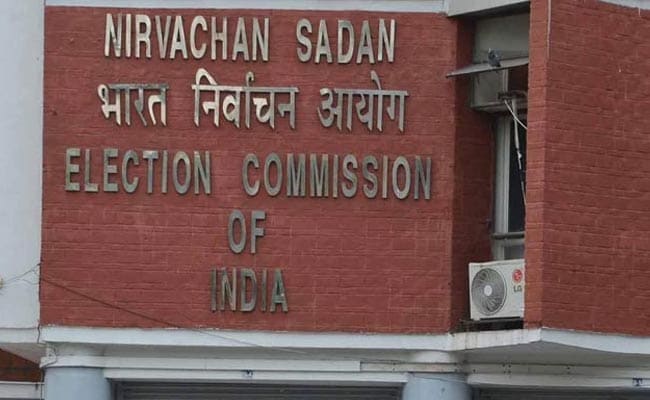
Election Commission wrote a letter warning all political parties of strict action against code violation.
New Delhi:
The Election Commission on Tuesday warned political parties that it will not remain a "silent spectator" and will undertake stern steps if the model code of conduct or poll laws are violated by them during the forthcoming Assembly elections in five states.
In a strong letter, citing a recent judgement of the Supreme Court, the EC said peace and tranquility during the polls process is "absolutely essential for free and peaceful conduct of elections in the country."
"As you are kindly aware the model code of conduct and various provisions of IPC, inter alia, provide that political parties and their leaders should desist from making statements to the effect of creating disharmony between different sections of society on the basis of religion as the same disturb peace and tranquility of the society which is absolutely essential for free and peaceful conduct of elections.
"Even, the apex court of the country has expressed its deep concerns in the matter vide its judgement and order dated January 2, 2017...," it said.
The EC's letter to the national and state parties added: "The Commission will not remain a silent spectator if the provisions of law or MCC are violated and no one can do it with impunity. The Commission will take stern actions for any violation under all powers available."
"All may please note it and issue suitable advisory to all concerned," it added.
In a landmark verdict seeking to separate religion, caste and other issues from politics, the Supreme Court, by a majority verdict, had held as "corrupt" the practice of candidates appealing for votes on the basis of these identities included not only him but his agents and voters.
The court held that the provisions of the Representation of Peoples Act, which say that seeking vote by a candidate in the name of "his" religion, caste, race and language in the election law, included candidates, his agents and voters also.
"An appeal in the name of religion, race, caste, community or language is impermissible under the R P Act, 1951 and would constitute a corrupt practice sufficient to annul the election in which such an appeal was made regardless whether the appeal was in the name of the candidate's religion or the religion of the election agent or that of the opponent or that of the voter's," the top court order had said.
Between February 4 and March 8, Uttar Pradesh, Uttarakhand, Punjab, Goa and Manipur are going for Assembly polls and the Model Code of Conduct came into force on January 4 when the EC announced the election schedule.
In a strong letter, citing a recent judgement of the Supreme Court, the EC said peace and tranquility during the polls process is "absolutely essential for free and peaceful conduct of elections in the country."
"As you are kindly aware the model code of conduct and various provisions of IPC, inter alia, provide that political parties and their leaders should desist from making statements to the effect of creating disharmony between different sections of society on the basis of religion as the same disturb peace and tranquility of the society which is absolutely essential for free and peaceful conduct of elections.
"Even, the apex court of the country has expressed its deep concerns in the matter vide its judgement and order dated January 2, 2017...," it said.
The EC's letter to the national and state parties added: "The Commission will not remain a silent spectator if the provisions of law or MCC are violated and no one can do it with impunity. The Commission will take stern actions for any violation under all powers available."
"All may please note it and issue suitable advisory to all concerned," it added.
In a landmark verdict seeking to separate religion, caste and other issues from politics, the Supreme Court, by a majority verdict, had held as "corrupt" the practice of candidates appealing for votes on the basis of these identities included not only him but his agents and voters.
The court held that the provisions of the Representation of Peoples Act, which say that seeking vote by a candidate in the name of "his" religion, caste, race and language in the election law, included candidates, his agents and voters also.
"An appeal in the name of religion, race, caste, community or language is impermissible under the R P Act, 1951 and would constitute a corrupt practice sufficient to annul the election in which such an appeal was made regardless whether the appeal was in the name of the candidate's religion or the religion of the election agent or that of the opponent or that of the voter's," the top court order had said.
Between February 4 and March 8, Uttar Pradesh, Uttarakhand, Punjab, Goa and Manipur are going for Assembly polls and the Model Code of Conduct came into force on January 4 when the EC announced the election schedule.
Track Latest News Live on NDTV.com and get news updates from India and around the world

